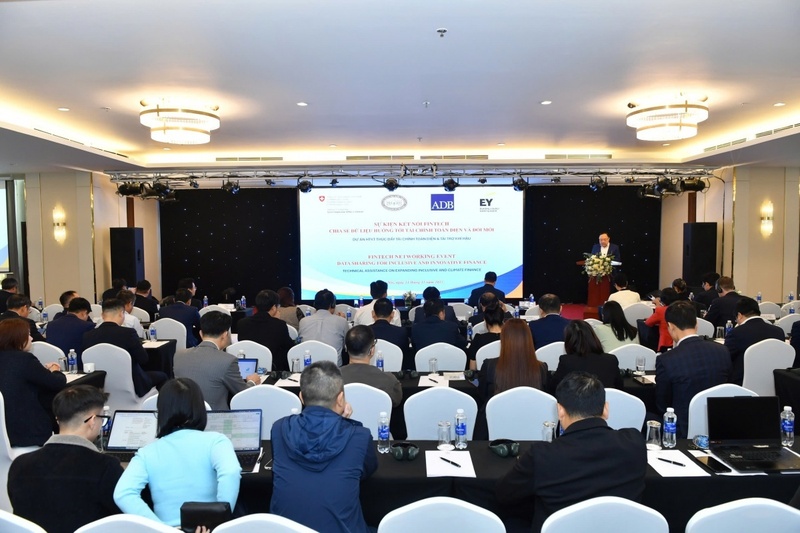Open APIs and open corridors for secure data sharing
In the process of financial digitization, Open API (Open Application Programming Interface) is not just a connection method, but is becoming the common language of the digital economy . With the ability to pave the way for banking data to be connected to other platforms in a controlled manner, Open API facilitates banking services to appear right where users need them, from e-commerce to digital payments, changing the traditional approach that focuses on the transaction counter. The novelty of this model does not lie in pure technology, but in the philosophy of "open banking", where data becomes the driving force for new business models, promoting innovation and expanding the scope of services.
Realizing the depth of this trend, the Vietnamese banking industry has built a relatively synchronous legal foundation to protect customers in all open connections. Sharing at the "Fintech Connection Event to share data towards financial inclusion and innovation", organized by the State Bank on November 14, Mr. Pham Anh Tuan, Director of the Payment Department, State Bank, said that data has been identified as an important asset and strategic resource in the Banking Industry Digital Transformation Strategy to 2030, issued on November 3, 2025. These orientations continue the chain of efforts from the Banking Industry Digital Transformation Plan from 2021 to 2025 and orientation to 2030. In particular, it is specified by Circular 64/2024/TT-NHNN, the first specialized legal document directly regulating Open API activities, effective from March 1, 2025.

“Fintech Connection Event to Share Data towards Financial Inclusion and Innovation”, organized by the State Bank on November 14. Photo: Duc Khanh
Putting user data at the center, Circular 64 clearly defines the roles of three entities: banks, third parties and customers. Accordingly, banks are the data controllers and are ultimately responsible for information security; third parties are only allowed to process data within the scope of the customer's permission; and customers retain absolute decision-making power over their data, including the right to consent, withdraw consent or look up sharing history. This model not only ensures system security, but also sets new standards for transparency and accountability in operating digital services.
From a technical perspective, Circular 64 creates a standardized structure with strict requirements on connection security. Mr. Thai Thanh Son, Deputy Head of Policy Management Department, Department of Information Technology, State Bank, said that APIs must comply with REST architecture, JSON data, OAuth 2.0 authentication, TLS communication from version 1.2 and use JWS digital signatures. The bank's information system must achieve at least level 3 in terms of security, and third parties must be assessed for the level and sign appropriate security commitments. These layers of protection create a technical "barrier" that helps the data sharing process take place conveniently while still ensuring security.
Recent implementation shows that major commercial banks have proactively connected with e-wallets and Fintech platforms, testing many services such as account inquiries, payment initiation or expanding distribution channels via API. Although each bank has a different level of readiness, the common point is that they have built a roadmap to standardize the system to ensure compliance with Circular 64, preparing for a more open, transparent and efficient financial services market.

Mr. Pham Anh Tuan, Director of Payment Department, State Bank of Vietnam, shared at the event. Photo: Duc Khanh
International experience and expectations for Vietnam's digital financial ecosystem
Not only a technical problem, Open API is also the key to help Vietnam accelerate the process of innovation and expand financial inclusion. From an international perspective, Ms. Maria Joao Pateguana, Head of the Private Economic Development Department, Asian Development Bank (ADB), assessed that Vietnam is entering a pivotal moment when digital transformation reshapes the way financial services are provided. She acknowledged the proactive role of the State Bank in creating a legal corridor, from the Law on Electronic Transactions, the Law on Credit Institutions to Circular 64, creating a foundation to promote the open banking model and controlled data sharing, thereby supporting small and medium enterprises to access capital better.
From another perspective, Ms. Nguyen Hong Giang, representative of the Swiss Federal Agency for Economic Development (SECO), commented that the financial and banking sector is at the forefront of transforming Vietnam's growth model. The strong expansion of non-cash payments has created a large enough user base, making it easy for the market to accept digital financial models. This makes Open API an essential component for Vietnam to go deeper into the process of financial digitalization, towards a more modern, connected and secure market.
Together with ADB and SECO, the Fintech Development Support Program in Vietnam is considering Open API as the focus of capacity building and knowledge transfer. This partnership, from an international perspective to the internal capacity of the Vietnamese banking industry, helps to better shape a future where open connectivity becomes the norm. A transparent, efficient, and innovative financial services market is what Open API is aiming for.
In the big picture, Open API not only paves the way for new business models but also contributes to perfecting the national data platform. When data is shared properly, for the right purpose and according to the right standards, the banking industry will create a greater influence in the digital economic ecosystem, promote financial inclusion and improve access to services for all users. Therefore, Open API is not just a technical or legal story, but an important piece in creating a modern financial market that can adapt quickly and serve the economy more effectively.
Mr. Pham Anh Tuan, Director of Payment Department, State Bank: The digital transformation strategy of the banking industry requires increased integration and expanded connectivity with other industries and fields to form a digital ecosystem, towards models such as: Open Banking, Embedded Finance and Banking as a Service (BaaS).
Source: https://congthuong.vn/khi-du-lieu-duoc-ket-noi-tuong-lai-ngan-hang-mo-the-nao-430504.html





![[Photo] Unique architecture of the deepest metro station in France](https://vphoto.vietnam.vn/thumb/1200x675/vietnam/resource/IMAGE/2025/11/14/1763107592365_ga-sau-nhat-nuoc-phap-duy-1-6403-jpg.webp)
![[Photo] Unique art of painting Tuong masks](https://vphoto.vietnam.vn/thumb/1200x675/vietnam/resource/IMAGE/2025/11/14/1763094089301_ndo_br_1-jpg.webp)





















![[Photo] Special class in Tra Linh](https://vphoto.vietnam.vn/thumb/1200x675/vietnam/resource/IMAGE/2025/11/14/1763078485441_ndo_br_lop-hoc-7-jpg.webp)









































































Comment (0)